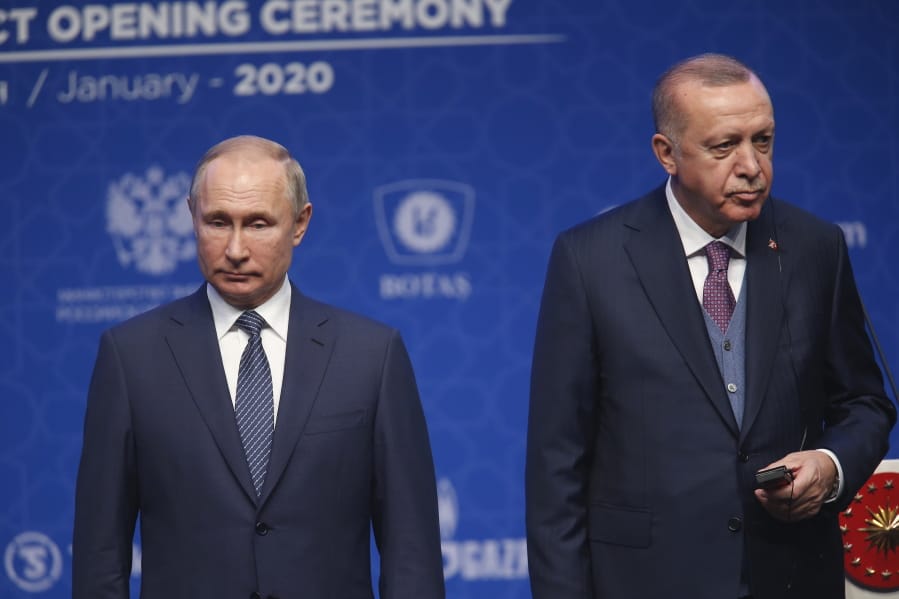BRUSSELS (AP) — Turkey and Russia called for a Jan. 12 cease-fire in war-torn Libya on Wednesday while European Union officials intensified diplomatic efforts to cool tensions in the North African nation by holding talks with its prime minister.
In a related diplomatic push in Rome, Italian Premier Giuseppe Conte met with Libya’s Gen. Khalifa Hifter, whose eastern-based forces have launched a fresh offensive against Libya’s U.N.-backed government, sparking the latest crisis.
Following a meeting in Istanbul, the leaders of Turkey and Russia called for a cease-fire in Libya to start at midnight on Jan. 12.
“Seeking a military solution to the ongoing conflict in Libya only causes further suffering and deepens the divisions among Libyans. Securing an immediate cease-fire is the foremost priority to start an inclusive intra-Libyan political process under U.N. auspices,” Turkish President Recep Tayyip Erdogan and Russian counterpart Vladimir Putin said in a joint statement.
Libya is currently governed by dueling authorities in the east and the west. The east-based government, backed by Hifter’s forces, is supported by the United Arab Emirates and Egypt, as well as France and Russia. The western, Tripoli-based government receives aid from Turkey, Qatar and Italy. Turkey has also recently begun sending Turkish soldiers to Libya for training and coordination.
The fighting has threatened to plunge Libya into violent chaos rivaling the 2011 conflict that ousted and killed longtime dictator Moammar Gadhafi.
“We have been following with great concern the recent developments, particularly the intensified fighting around Tripoli, in long-suffering Libya,” Putin and Erdogan said. “The worsening situation in Libya is undermining the security and stability of Libya’s wider neighborhood, the entire Mediterranean region, as well as the African continent, triggering irregular migration, the further spread of weapons, terrorism and other criminal activities including illicit trafficking.”
Meanwhile in Brussels, Libyan Prime Minister Fayez Sarraj met with European Council President Charles Michel and EU foreign affairs chief Josep Borrell. Earlier this week, the EU’s top diplomat and the foreign ministers of Britain, France, Germany and Italy condemned Turkey’s plans to deploy troops to Libya.
“Michel expressed concerns about the worrying military escalations in Libya. He underlined that there is no military solution to the Libyan crisis, only a political process can bring peace and stability closer,” the European Council said in a statement. “Libyans should be at the heart of defining their own future.”
Borrell called the situation in Libya “very dangerous,” adding “we are maybe facing a watershed point.”
Hifter traveled to Rome on a previously unannounced visit to meet with the Italian premier, Conte. An Italian government official said Serraj was also expected to meet with Conte later Wednesday, but the official later said Serraj apparently wouldn’t come after all.
Turkey’s parliament authorized the deployment of troops to Libya last Thursday.
Michel will travel to Turkey on Saturday to meet with Erdogan to reiterate the EU’s message of de-escalation and then head to Cairo to discuss the Libyan crisis with Egyptian President Abdel Fattah el-Sissi.
Michel also raised objections to the recent maritime pact between Turkey and Libya that has fueled tensions in the Mediterranean, particularly over drilling rights for gas and oil exploration.
The agreement would give Turkey and Libya access to an economic zone across the Mediterranean despite the objections of Greece, Egypt and Cyprus, which lie between the two geographically and say the deal is contrary to international law.
According to the European Council’s statement, Michel told Sarraj that the maritime deal “infringes upon the sovereign rights of third states and does not comply with the Law of the Sea.”
[–]
Zeynep Bilginsoy reported from Istanbul. Nicole Winfield contributed to this report from Rome.



